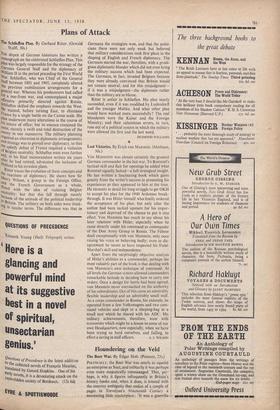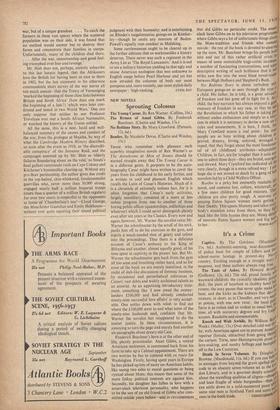Floundering on the Veld
The Boer War. By Edgar Holt. (Putnam, 25s.)
POLITICALLY, the Boer War was nearly as squalid an enterprise as Suez, and militarily it was perhaps even more ,majestically mismanaged. That, per- haps, is why it figuies infrequently in Britain's history books ,and, when it does, is treated with the smarmy ambiguity that makes of a couple of pages in -Trevelyan's Nineteenth Century a nauseating little masterpiece 'it was a .guerrilla war, but of a unique grandeur. . . . To catch the farmers in these vast spaces where the scattered population was on their side, it was found that no method would answer but to destroy their farms and concentrate their families in camps. Unfortunately, many of the children died there. . . . After the war, statesmanship and good feel- ing triumphed over fear and revenge.'
Mr. Holt does not, perhaps, entirely subscribe to this last lunatic legend, that the Afrikaners love the British for having been so nice to them in 1902, but the last statement in his otherwise commendable short survey of the war leaves all too much unsaid—that the Treaty of Vereeniging `marked the beginning of those close links between Britain and South Africa' (how does one mark the beginning of a link?) 'which were later con- firmed and tested in two World Wars.' One can only suppose that neither he nor Professor Trevelyan ever met a South African Nationalist, or watched the history of the Union unfold.
All the same, this is a neat, lucid and well- balanced summary of the causes and conduct of the war, from the prologue at Majuba, by way of what the Cambridge Modern History described, so soon after the event as 1910, as 'the discredit-. able conspiracy' of the Jameson Raid, and the campaigns summed up by Mr. 'Holt as 'elderly failures floundering about on the veld,' to Smuts's final gallant commando raids on Cape Colony and Kitchener's businesslike clearing-up. Without any pro-Boer partisanship, the author gives due credit to the top-hatted, chin-whiskered; fundamentalist guerrillas who, never more than 50,000 strong, engaged nearly half a million Imperial troops (more than a quarter of a million British regulars) for over two years; is respectful to the opponents at home of 'Chamberlain's war'—Lloyd George, the Manchester Guardian and Emily Hobhouse- without ever quite equating their sound political
judgment with their humanity; and is entertaining on Rhodes's megalomaniac goings-on in Kimber- ley—though he omits any mention of Baden- Powell's equally rum conduct in Mafeking.
Some carelessnesses ought to be cleared up in the further editions that so workmanlike a history deserves. There never was such a regiment in the Army List as 'The Royal Lancasters.' And it is sad to see a military historian yielding to that ugly and otiose American neologism that was unknown to English usage before Pearl Harbour and yet has now invaded the columns of both our most pompous and, more recently, our most stylish daily
newspaper : 'high-ranking.' CYRIL RAY



































 Previous page
Previous page